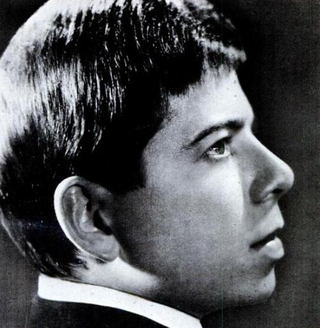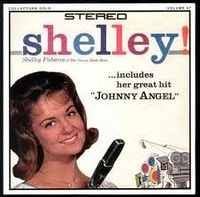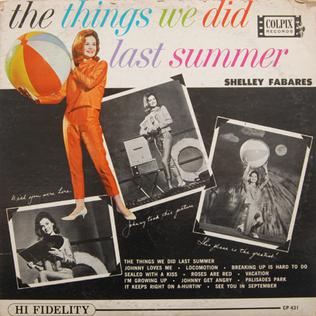Related Research Articles

Robert Charles Goldsboro is an American pop and country singer and songwriter. He had a string of pop and country hits in the 1960s and 1970s, including his signature No. 1 hit "Honey", which sold over 1 million copies in the United States, and the UK top-10 single "Summer ".

John Wayne Conlee is an American country music singer.

"I Can't Stop Loving You" is a popular song written and composed by the country musician Don Gibson from his 1958 album Oh Lonesome Me, who first recorded it on December 3, 1957, for RCA Victor Records. It was released in 1958 as the B-side of "Oh Lonesome Me", becoming a double-sided country hit single. At the time of Gibson's death in 2003, the song had been recorded by more than 700 artists, most notably by Ray Charles, whose recording reached No. 1 on the Billboard Hot 100 chart.
"Heartaches by the Number" is a popular country song written by Harlan Howard, and published in 1959. The sheet music was a best seller in both the US and Britain in January 1960.

The song "Ring of Fire" was made popular by Johnny Cash after it appeared on his 1963 compilation album Ring of Fire: The Best of Johnny Cash. Written by Cash's eventual second wife, June Carter, and songwriter Merle Kilgore, "(Love's) Ring of Fire" was originally recorded by June's sister, Anita Carter, on her 1962 album, Folk Songs Old and New.
"If I Were a Carpenter" is a folk song written by Tim Hardin in the 1960s, and re-recorded with commercial success by various artists including Bobby Darin, The Four Tops and Johnny Cash. Hardin's own recording of the piece appeared on his 1967 album Tim Hardin 2. It was one of two songs from that release performed by Hardin at Woodstock in 1969. The song, believed by some to be about male romantic insecurity, is rumored to have been inspired by his love for actress Susan Morss, as well as the construction of Hardin's recording studio.

"Help Me Make It Through the Night" is a country ballad written and composed by Kris Kristofferson and released on his 1970 album Kristofferson. It was covered later in 1970 by Sammi Smith, on the album Help Me Make It Through the Night. In 1982, Kris did a re-recording with Brenda Lee for the compilation album The Winning Hand. It has been covered since by many other artists from Tammy Wynette and Johnny Cash to Elvis Presley and Joan Baez and Bryan Ferry and Mark Eitzel.
"Sweet Dreams" or "Sweet Dreams (of You)" is a country ballad, which was written by Don Gibson. Gibson originally recorded the song in 1955; his version hit the top ten of Billboard's country chart, but was eclipsed by the success of a competing recording by Faron Young. In 1960, after Gibson had established himself as a country music superstar, he released a new take as a single. This version also charted in the top ten on the country chart and also crossed over to the Billboard Hot 100, where it peaked at No.93. The song has become a country standard, with other notable versions by Patsy Cline and Emmylou Harris.

"Break It to Me Gently" is a pop song written by blues musician Joe Seneca with lyrics by Diane Lampert. Both Brenda Lee and Juice Newton were met with considerable success with their versions of the song.
Ray Kennedy is an American country music artist. He has recorded two albums for Atlantic Records. His two albums produced four singles that appeared on the Hot Country Songs charts; 1990's "What a Way to Go" was his only top 40 country hit and peaked at No. 10.
"Funny How Time Slips Away" is a song written by Willie Nelson and first recorded by country singer Billy Walker. Walker's version was issued as a single by Columbia Records in June 1961 and peaked at number 23 on the Hot C&W Sides chart. The song has been featured in several live action films and television shows, such as in the first episode of the second season of AMC’s Better Call Saul and in the 2020 Netflix drama The Devil All the Time.

"Daddy Sang Bass" is a song written by Carl Perkins, with lines from the chorus of "Will the Circle Be Unbroken?" and recorded by American country music singer Johnny Cash. It was released in November 1968 as the first single from the album The Holy Land. The song was Cash's sixty-first release on the country chart, going on to No. 1 on the Billboard country chart for 6 weeks and spending a total of 19 weeks there. The single reached No. 56 on the Cashbox pop singles chart in 1969. "Daddy Sang Bass" was also released on the Columbia Records Hall of Fame Series as a 45, #13-33153, b/w "Folsom Prison Blues". The record was nominated in the CMA awards category of Single of the Year by the Country Music Association (CMA) in 1969.
"She Called Me Baby" is a country song written in 1961 by Harlan Howard.
"I Love You Because" is a song written and recorded by country music singer-songwriter Leon Payne in 1949. The song has been covered by several artists throughout the years, including hit cover versions by Al Martino in 1963 and Jim Reeves in 1964.
"The Matador" is a song co-written and recorded by American country music artist Johnny Cash. The song was written by Cash and his wife, June Carter Cash. It was later included on the album Old Golden Throat; along with the b-side "Still in Town".It was released in September 1963. Cash Box described it as "a medium-paced, chorus-backed Latin-styled romancer with a contagious repeating riff throughout."
"Making Believe" is a country music song written by Jimmy Work. Kitty Wells recorded a chart-topping version in 1955. The song is on many lists of all-time greatest country music songs and has been covered by scores of artists over the past fifty years, including Thorleifs, Bob Dylan, Johnny Cash, Don Gibson, Roy Acuff, Lefty Frizzell, Wanda Jackson, Connie Francis, Ray Charles, Anita Carter, Dolly Parton, Emmylou Harris, Merle Haggard, The Kendalls, Ernest Tubb, Skeeter Davis, The Haden Triplets, Social Distortion and Volbeat. The song is occasionally called "Makin' Believe".

"Sea of Heartbreak" is a song written by Paul Hampton and Hal David and recorded by Don Gibson in 1961. The song reached #2 on the Billboard Hot Country Singles & Tracks chart.

Shelley! is the self-titled debut pop album by singer and actress Shelley Fabares released in 1962 on Colpix Records. It was available in both mono and stereo, catalogue numbers CP-426 and SCP-426. The album was produced and arranged by Stu Phillips and recorded at United Western Recorders in Hollywood, California. Shelley! peaked on the Billboard Top LPs chart at No. 106 in July 1962. The album includes the hit single, "Johnny Angel", which reached number one on the Billboard Hot 100 in April 1962.

The Things We Did Last Summer is the second studio pop album by singer and actress Shelley Fabares released in 1962 on Colpix Records. It was available in both mono and stereo, catalogue numbers CP-431 and SCP-431. The album was produced and arranged by Stu Phillips who had produced her previous record. It peaked on the Billboard 200 Chart at #121 in October 1962. The album features her Top 40 hit single "Johnny Loves Me". It also includes the second hit single from the album, "The Things We Did Last Summer".
"I Don't Remember Loving You" is a song written by Harlan Howard and Bobby Braddock, and recorded by American country music artist John Conlee. It was released in October 1982 as the third single from the album Busted. The song reached #10 on the Billboard Hot Country Singles & Tracks chart.
References
- ↑ Whitburn, Joel (1996). The Billboard Book of Top 40 Country Hits, p. 68. ISBN 0-8230-7632-6.
- ↑ Whitburn, Joel (2000). The Billboard Book of Top 40 Hits, p. 121. ISBN 0-8230-7690-3.
- ↑ "Ray Charles". Grammy.com.
- ↑ Whitburn, Joel (1996). The Billboard Book of Top 40 Country Hits, p. 78. ISBN 0-8230-7632-6.